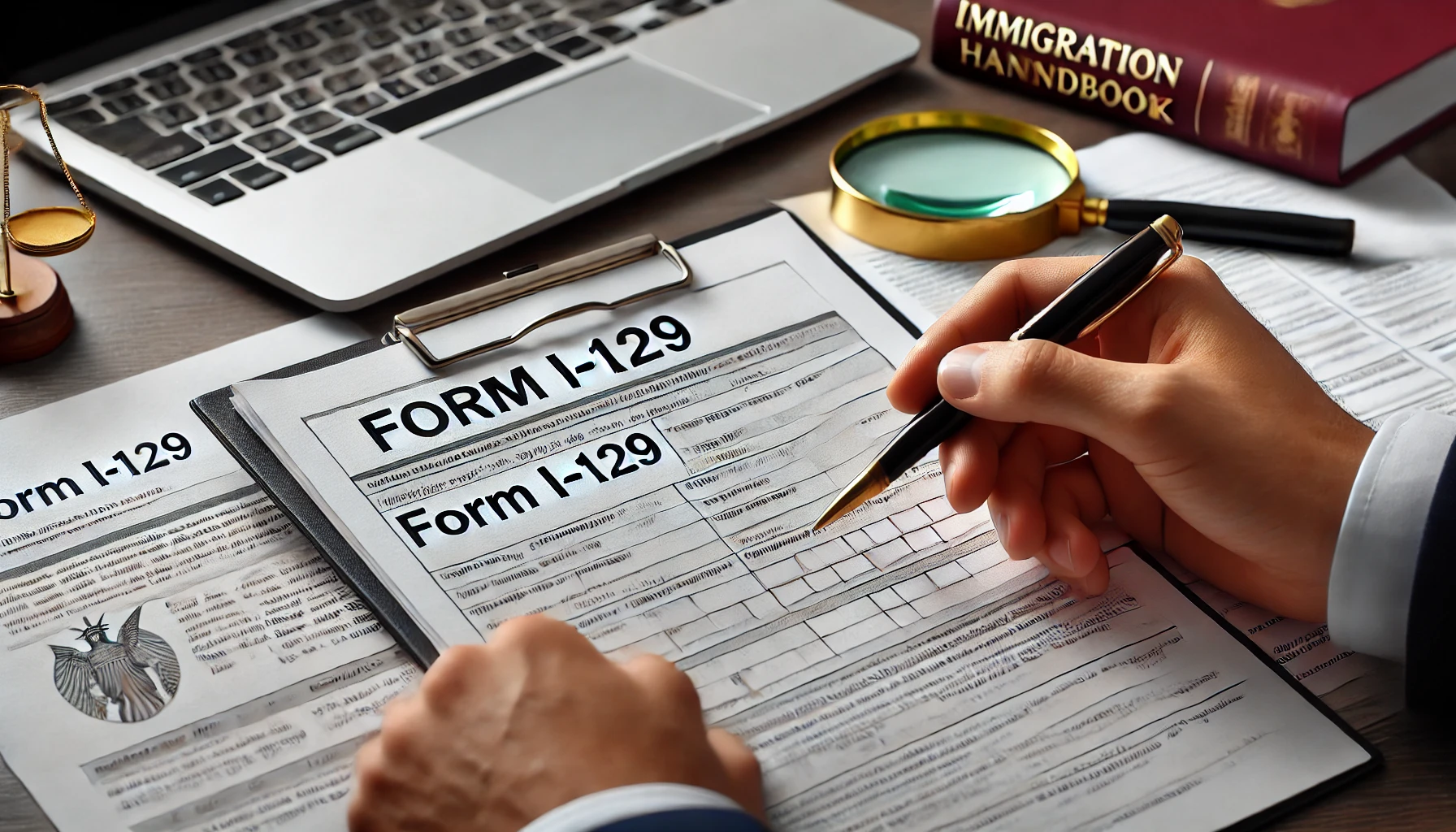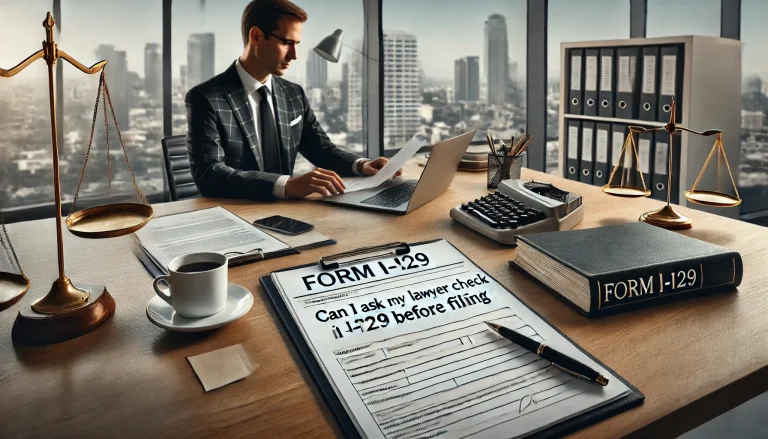When it comes to filing immigration petitions in the U.S., one of the most crucial steps is ensuring that the paperwork is done correctly. For many foreign workers and employers, this includes Form I-129, the Petition for a Nonimmigrant Worker. This form allows U.S. employers to request that foreign workers be allowed to come to the U.S. under various nonimmigrant visa categories, including H-1B, L-1, O-1, and others. Given the complexity of immigration laws, many wonder: Can I ask my lawyer to check I-129 before filing? The simple answer is yes—and doing so can significantly improve your chances of a successful petition. Here’s a more detailed look at why this step is so important.
What Is Form I-129?
Form I-129 is a petition used by U.S. employers to request a nonimmigrant visa for foreign workers. These workers are typically employed in specialized roles, requiring specific qualifications or skills. Common visa categories for which Form I-129 is used include:
- H-1B: For workers in specialized fields like technology, engineering, or healthcare.
- L-1: For intra-company transferees, such as managers or employees with specialized knowledge.
- O-1: For individuals with extraordinary abilities in fields like science, business, or the arts.
The form requires detailed information about both the employer and the employee, including:
- Employer’s business details.
- The worker’s qualifications, job title, and work location.
- Any additional supporting documentation that can prove the worker’s eligibility for the visa.
Filing this form correctly is essential to ensure that the worker is granted the appropriate visa and able to start their role in the U.S. Without proper completion and documentation, the petition can be delayed or even denied.
Can I Ask My Lawyer to Check I-129 Before Filing?
Yes, you can—and you absolutely should—ask your lawyer to review Form I-129 before filing it. This form, used to petition for a nonimmigrant worker visa, is one of the most important steps in the immigration process for U.S. employers and foreign workers. Even minor errors or omissions can lead to delays, requests for additional evidence (RFEs), or even denial of the petition.
A lawyer brings expert knowledge of immigration laws and ensures that your petition is accurate, complete, and compliant with the latest regulations. They will check every detail, from the job description and employer details to the supporting documents, to make sure nothing is missed. This is especially critical if your case is complex, such as filing under a special visa category like H-1B, L-1, or O-1, or if you have a history of immigration issues.
By having a lawyer review your Form I-129, you reduce the risk of delays and improve your chances of approval. It’s a step worth taking to save time, avoid stress, and ensure a smooth process.
Why Should a Lawyer Review Form I-129?
When preparing a complex legal document like Form I-129, it’s essential to ensure that everything is completed accurately and fully. While it’s possible to file the form on your own, many choose to ask a lawyer to check the form before filing for several important reasons:
Accuracy and Completeness
One of the primary reasons to involve a lawyer is to ensure that all information on the form is accurate and complete. A missed signature or incorrect data can result in delays, requests for additional evidence (RFE), or outright denials. Lawyers are trained to spot errors or omissions that may be overlooked by someone unfamiliar with the intricacies of immigration law.
Avoiding Common Mistakes
Filling out immigration forms requires more than just basic knowledge—it involves understanding complex legal terms and specific instructions. Many applicants inadvertently make mistakes, such as:
- Using incorrect job titles or descriptions.
- Leaving out important supporting documents.
- Misunderstanding specific visa category requirements.
A lawyer can identify these errors before the form is submitted, minimizing the chances of any issues that could result in delays or denials.
Legal Compliance
Immigration laws are constantly evolving, and compliance is crucial for approval. A lawyer’s role is to ensure that the form aligns with current laws and regulations, such as eligibility criteria and documentation requirements. For example, certain visa categories have specific requirements that must be met in order to qualify, and a lawyer can help interpret these rules in the context of your petition.
Preventing Delays and Denials
Filing a petition like Form I-129 involves significant processing time, often several months. A small error or omission on the form can cause delays or even result in denial. In the worst-case scenario, you may have to reapply, which can waste valuable time. Having a lawyer review your form before submission helps ensure that everything is in order and reduces the chances of unnecessary delays.
How Can a Lawyer Help With Form I-129?
A lawyer’s involvement goes beyond just reviewing the completed form. They play an important role throughout the process, offering guidance and advice that can make a significant difference.
Document Preparation
To ensure a smooth filing process, you need to submit various supporting documents along with Form I-129. These may include the worker’s educational certificates, job contracts, or proof of specialized knowledge. A lawyer will help you organize these documents and make sure they meet the specific requirements set by USCIS.
Additionally, your lawyer will help you prepare any additional evidence required for your specific visa category. For example, an H-1B petition requires evidence that the worker has the necessary education or experience for the job, while an O-1 petition may require proof of extraordinary ability in the field.
Legal Guidance
Filling out Form I-129 requires understanding legal terminology and immigration law. Lawyers have the expertise to explain these complex terms and ensure that they are correctly applied in the context of your petition. For example, you may not be aware of all the requirements for your specific visa category, or you might be unsure about how to present supporting documentation. A lawyer can help clarify these points, ensuring that your application is legally sound.
Filing Strategy
One of the key advantages of hiring a lawyer is their ability to guide you on timing and strategy. Some visa categories, like H-1B, have annual caps on the number of visas issued. A lawyer can help ensure that your petition is filed within the required window, avoiding missing out on these caps. They can also help you plan the best time to submit your petition based on your specific circumstances, such as your work start date or visa expiration date.
When Should You Involve a Lawyer?
While it’s not mandatory to hire a lawyer to file Form I-129, there are certain points in the process when it’s particularly helpful to have legal expertise.
Before Completing the Form
If you’re unsure about which visa category you should apply for, a lawyer can provide guidance on the most suitable option. They can also help clarify any eligibility requirements, ensuring that you meet the qualifications before you begin completing the form.
After Drafting the Form
Once you’ve completed the form, it’s advisable to have a lawyer review it before submission. They will check for accuracy, completeness, and compliance with immigration laws. This review ensures that your petition is in the best shape possible before it’s filed with USCIS.
If Complications Arise
If your case is more complex—for example, if you have a history of immigration violations or are applying under a special visa category—having a lawyer on hand can be especially helpful. They can navigate the additional documentation requirements and ensure that you present your case in the best light possible.
Costs of Legal Assistance
While hiring a lawyer involves additional costs, the value of their expertise often far outweighs the expense. Legal fees for reviewing Form I-129 can vary depending on the complexity of the case and the lawyer’s experience. However, investing in legal assistance helps prevent costly mistakes, delays, or denials that could arise from an improperly filed petition.
Do You Need a Lawyer for Form I-129?
In some cases, you might be able to file Form I-129 on your own. For example, if the petition is straightforward, the worker’s qualifications are clear, and there are no complicating factors, you might not need a lawyer. However, in most cases—especially if the petition falls under a specialized visa category or involves complex circumstances—it’s a good idea to seek legal help. A lawyer can guide you through the process and ensure that your petition has the best chance of approval.
How to Choose the Right Lawyer
If you decide to hire a lawyer to review your Form I-129, here are some tips to help you find the right one:
- Experience with Immigration Law: Look for a lawyer with specific experience in handling employment-based visa petitions, particularly Form I-129.
- Credentials: Make sure the lawyer is licensed to practice law and has a good track record with immigration cases.
- Clear Communication: Choose a lawyer who can explain complex legal concepts in a way that’s easy to understand, and who listens to your concerns.
Conclusion
In conclusion, if you’re asking, “Can I ask my lawyer to check I-129 before filing?” the answer is a resounding yes. Having a lawyer review your Form I-129 is a smart decision that can save time, reduce stress, and improve your chances of success. Legal professionals offer critical expertise in document preparation, legal compliance, and filing strategy, all of which are essential for a successful petition. While it’s not mandatory, it’s a good idea to involve a lawyer, especially for more complicated cases. Their experience can help ensure that your petition is complete, accurate, and submitted on time, giving you the best chance for approval.
FAQs
Is it mandatory to have a lawyer review Form I-129 before filing?
No, it’s not mandatory, but having a lawyer ensures accuracy, compliance, and reduces risks of delays or denials.
What documents should I prepare before asking a lawyer to review Form I-129?
Gather employment contracts, proof of qualifications, and supporting evidence specific to your visa category.
How long does it take for a lawyer to review Form I-129?
Typically, a lawyer can review the form within a few days, depending on the complexity of the case.
Can a lawyer help with issues after filing Form I-129?
Yes, a lawyer can assist with responding to RFEs (Requests for Evidence) or appeals if issues arise after filing.
What is the cost of having a lawyer review Form I-129?
Fees vary but usually range between $500–$2,000, depending on the lawyer’s experience and case complexity.
Article Recommendations
Wendys Lawsuit Michigan: What the Case Reveals About Corporate Accountability in the Food Industry
Third Culture Bakery Lawsuit: How Public Opinion Influences Intellectual Property Decisions
Abilene Asbestos Legal Question: How to Identify, Handle, and Seek Justice for Asbestos Exposure




